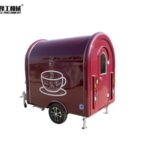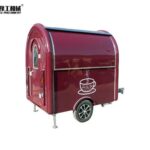Coffee food trailer is essentially a mobile café on wheels, equipped with professional coffee machines, grinders, water systems, and storage for beans, milk, and other ingredients. Different from traditional brick-and-mortar cafés, these trailers operate in diverse locations, from bustling city streets and markets to music festivals and corporate events. It can be equipped with high-quality espresso machines, grinders, and refrigeration units. It allows business owners to serve freshly brewed coffee, specialty drinks, and light snacks in almost any location.
Features of A Coffee Food Mobile Trailer
Coffee food trailer is designed with both efficiency and customer experience in mind. Some of the most important features include:
- Professional coffee equipment integration: Espresso machines, grinders, blenders, and brewers are built into the trailer to replicate the performance of a full café.
- Compact yet ergonomic layout: The interior is carefully designed so baristas can move efficiently between equipment and serve customers quickly.
- Reliable power and water systems: Most trailers come with fresh water tanks, wastewater storage, and power options that can be connected to external supply or generators.
- Customizable design: Owners can brand the trailer with unique signage, logos, and décor to reflect their coffee shop identity.
- Food safety compliance: Surfaces, sinks, and storage meet hygiene standards for beverage preparation.
- Mobility and portability: Built on durable chassis and wheels, the trailer can be transported to various locations.
Advantages of Food Trailer for Coffee
Entrepreneurs and coffee enthusiasts are drawn to coffee food trailers because they provide unique benefits compared to traditional cafés.
- Lower investment cost: Opening a fixed-location coffee shop can be very expensive, but a trailer significantly reduces the initial capital required.
- Flexibility in location: You can move the trailer to where demand is highest, adjusting to changing customer flows.
- Fast market entry: Setting up a trailer takes less time than renovating or building a coffee shop.
- High profit margins: Coffee has one of the best markups in the food and beverage sector, and a mobile unit keeps operating costs manageable.
- Brand building opportunities: Eye-catching trailer designs attract attention and help build a recognizable coffee brand.
Uses of Coffee Food Truck Trailers
The versatility of coffee food trailer makes them suitable for multiple business models:
- Event Catering
Weddings, corporate gatherings, and festivals often require on-site beverage services. Coffee trailers provide a professional setup without the logistical hassles of renting equipment. - Daily Operations
Some entrepreneurs park their trailers in high-footfall areas like business districts or university campuses, operating on a regular schedule to build a loyal customer base. - Private Parties and Subscriptions
High-end trailers cater to private events, while subscription-based models deliver weekly coffee bundles to offices or neighborhoods.
How Can We Work in A Coffee Trailer?
- Preparation
Before opening, baristas grind beans, stock supplies, and test equipment. Some trailers pre-brew cold brew or batch cocktails for efficiency. - Service Flow
Customers place orders through the serving window. Baristas prepare drinks using the espresso machine, froth milk, and add syrups or toppings. Food items like pastries or sandwiches are packaged and handed over with the beverage. - Waste Management
Operators must comply with local regulations for disposing of coffee grounds, milk cartons, and other waste. Many use biodegradable cups and composting systems to minimize environmental impact. - Closing Procedures
At the end of the day, the trailer is cleaned, equipment is sanitized, and inventory is restocked. Generators are turned off, and tanks are emptied if necessary.
How to Choose the Right Coffee Food Trailer?
Selecting the right trailer is critical for long-term success. Key factors to consider include:
- Size and dimensions: Ensure the trailer fits your operational needs and local regulations.
- Equipment package: Decide whether you need a single espresso machine or a full range of brewing tools.
- Power and water capacity: Choose systems that match your daily output and working hours.
- Customization: Look for manufacturers that allow tailored designs, branding, and layout adjustments.
- Durability and quality: Strong frames and food-grade interiors ensure longevity.



